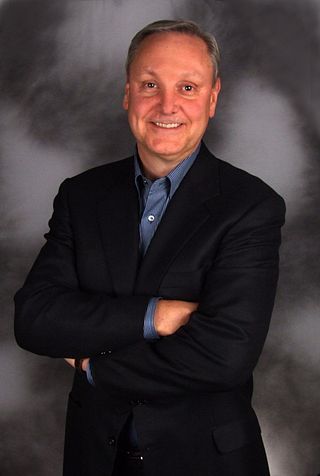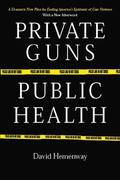
Gun control, or firearms regulation, is the set of laws or policies that regulate the manufacture, sale, transfer, possession, modification, or use of firearms by civilians.

John Richard Lott Jr. is an American economist, political commentator, and gun rights advocate. Lott was formerly employed at various academic institutions and at the American Enterprise Institute conservative think tank. He is the former president of the Crime Prevention Research Center, a nonprofit he founded in 2013. He worked in the Office of Justice Programs within the U.S. Department of Justice under the Donald Trump administration from October 2020 to January 2021. Lott holds a Ph.D. in economics from UCLA.

More Guns, Less Crime is a book by John R. Lott Jr. that says violent crime rates go down when states pass "shall issue" concealed carry laws. He presents the results of his statistical analysis of crime data for every county in the United States during 29 years from 1977 to 2005. Each edition of the book was refereed by the University of Chicago Press. As of 2019, the book is no longer published by the University of Chicago Press. The book examines city, county and state level data from the entire United States and measures the impact of 13 different types of gun control laws on crime rates. The book expands on an earlier study published in 1997 by Lott and his co-author David Mustard in The Journal of Legal Studies and by Lott and his co-author John Whitley in The Journal of Law and Economics, October 2001.

The right to keep and bear arms is a legal right for people to possess weapons (arms) for the preservation of life, liberty, and property. The purpose of gun rights is for self-defense, as well as hunting and sporting activities. Countries that guarantee a right to keep and bear arms include Albania, Czech Republic, Guatemala, Mexico, the Philippines, Switzerland, Ukraine, the United States and Yemen.
Gary Kleck is a criminologist and the David J. Bordua Professor Emeritus of Criminology at Florida State University.

Gun politics in the United States is characterized by two primary opposing ideologies regarding private firearm ownership.

Freakonomics: A Rogue Economist Explores the Hidden Side of Everything is the debut non-fiction book by University of Chicago economist Steven Levitt and New York Times journalist Stephen J. Dubner. Published on April 12, 2005, by William Morrow, the book has been described as melding pop culture with economics. By late 2009, the book had sold over 4 million copies worldwide. Based on the success of the original book, Levitt and Dubner have grown the Freakonomics brand into a multi-media franchise, with a sequel book, a feature film, a regular radio segment on National Public Radio, and a weekly blog.
James Lindgren is a professor of law at Northwestern University. Born in 1952 in Rockford, Illinois, Lindgren graduated from Yale College and the University of Chicago Law School (1977), where he was an editor of the University of Chicago Law Review. He received his Ph.D. in Sociology from the University of Chicago in 2009.
On January 16, 2002, a school shooting occurred at the Appalachian School of Law, an American Bar Association accredited private law school in Grundy, Virginia, United States. Three people were killed, and three others were wounded when a former student, 43-year-old Nigerian immigrant Peter Odighizuwa, opened fire in the school with a handgun.

Gun violence is a term of political, economic and sociological interest referring to the tens of thousands of annual firearms-related deaths and injuries occurring in the United States.

Freedomnomics: Why the Free Market Works and Other Half-Baked Theories Don't is a book by writer and public policy researcher John R. Lott, Jr., author of previous works More Guns, Less Crime and The Bias Against Guns. Freedomnomics takes an economic look at the effects of the free market, and presents some arguments against those found in Freakonomics by Steven D. Levitt and Stephen J. Dubner. The publications The American and National Review ran positive reviews, with critic Robert VerBruggen stating that Lott "renders lots of charts, graphs and statistical analysis into clear, uncomplicated conversation."
Jamaican law allows firearm ownership on may-issue basis. With approximately eight civilian firearms per 100 people, Jamaica is the 92nd most armed country in the world. Gun laws in Jamaica began to be tightened in the early 1970s, when Jamaica experienced a rise in violence associated with criminal gangs and political polarization between supporters of the People's National Party and the Jamaica Labour Party.

American Handgunner is a magazine dedicated to handguns, handgun hunting, competition shooting, reloading, tactical knife and other shooting-related activities in the United States. It is a sister publication to Guns and American Cop.

Edward W. Conard is an American businessman, author and scholar. He is a New York Times-bestselling author of The Upside of Inequality: How Good Intentions Undermine the Middle Class and Unintended Consequences: Why Everything You've Been Told About the Economy Is Wrong; and a contributor to Oxford University Press' United States Income, Wealth, Consumption, and Inequality. Conard is an adjunct fellow at the American Enterprise Institute for Public Policy Research. Previously, he was a managing director at Bain Capital, where he worked closely with former presidential candidate Mitt Romney.

Private Guns, Public Health is a 2004 policy opinion book by David Hemenway, an economist who has served as Professor of Health Policy at the Harvard School of Public Health as well as the Director of Harvard's Injury Control Research Center. He argues that the widespread ownership of firearms in private hands in the U.S. promotes the spread of the "disease" of gun violence, and he takes a collective interpretation of the Second Amendment while stating that increased regulations are absolutely necessary in the purposes of public safety. Hemenway makes the central case that "more guns in a community lead to more homicide". He published the book through the University of Michigan Press in 2004. A new edition was released, also by the University of Michigan Press, in 2017.

Defensive gun use (DGU) is the use or presentation of a firearm for self-defense, defense of others or, in some cases, protecting property. The frequency of incidents involving DGU and their effectiveness in providing safety and reducing crime are controversial issues in gun politics and criminology, chiefly in the United States. Different authors and studies employ different criteria for what constitutes a defensive gun use which leads to controversy in comparing statistical results. Perceptions of defensive gun use are recurring themes in discussions over gun rights, gun control, armed police, open and concealed carry of firearms.

Stephen P. Halbrook is a senior fellow at the Independent Institute and an author and lawyer known for his litigation on cases involving laws pertaining to firearms. He has written extensively about the original meanings of the Second Amendment and the Fourteenth Amendment. He has argued and won three cases before the US Supreme Court: Printz v. United States, United States v. Thompson-Center Arms Company, and Castillo v. United States. He has also written briefs in many other cases, including the Supreme Court cases Small v. United States and McDonald v. Chicago. In District of Columbia v. Heller, he wrote a brief on behalf of the majority of both houses of Congress. He has written many books and articles on the topic of gun control, some of which have been cited in Supreme Court opinions. He has testified before congress on multiple occasions. Halbrook's most popular book is That Every Man Be Armed, originally published in 1984. The book is an analysis of the legal history and original intent of the Second Amendment.

The Public Safety and Recreational Firearms Use Protection Act, popularly known as the Federal Assault Weapons Ban, was subtitle A of title XI of the Violent Crime Control and Law Enforcement Act of 1994, a United States federal law which included a prohibition on the manufacture for civilian use of certain semi-automatic firearms that were defined as assault weapons as well as certain ammunition magazines that were defined as large capacity.

A universal background check for guns is a policy that requires a background check for all gun sales or transfers, regardless of where they occur or who is involved. This includes sales at gun shows, private sales between individuals, and sales made online. The idea is to close loopholes in existing laws that currently allow some gun purchases to occur without background checks.
Abramski v. United States, 573 U.S. 169 (2014), was a United States Supreme Court case in which the Court found that making arrangements for a straw purchase of a gun is in violation of the Gun Control Act of 1968, and is different from re-selling or gifting a previously purchased gun. In the Abramski case, a former police officer from Virginia took advantage of a local discount to buy a gun for his uncle and later transferred it to Pennsylvania—the uncle's residence—using the appropriate federal procedure. During the purchase, Abramski falsely declared that he was purchasing the gun for himself.













